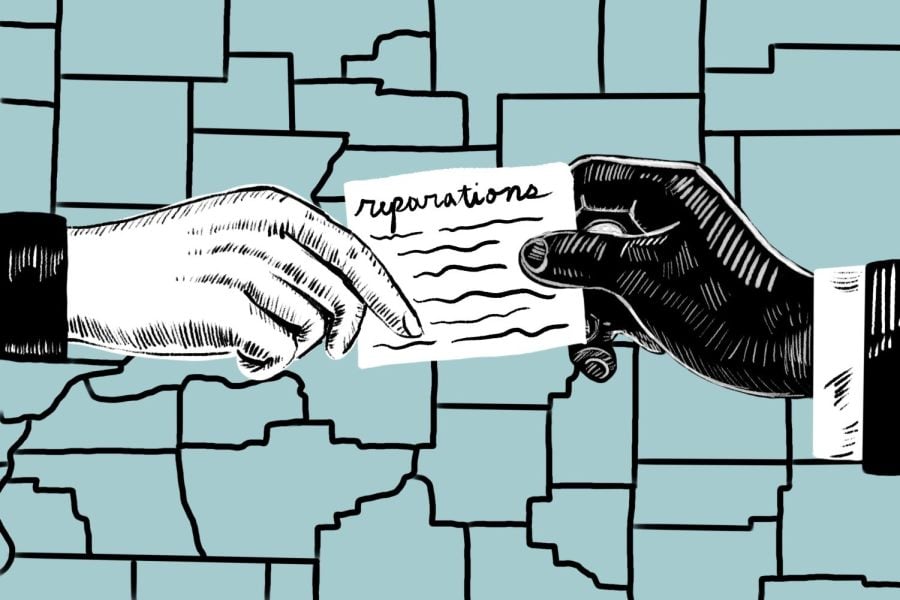Illinois commission seeks public input on potential statewide reparations program
Daily file illustration by Lily Ogburn
The Reparations Committee is seeking applicants for working groups that will focus on economic development, community unity, educational initiatives and housing.
April 11, 2023
As Evanston navigates the implementation of direct cash payments to recipients of the Restorative Housing Program, a state commission is hoping to gain input from the public on a possible statewide reparations program.
In 2022, the Illinois Economic Opportunity Act authorized the African Descent-Citizens Reparations Commission. The commission is responsible for researching and educating the public on possible measures “to ensure equity, equality, and parity for African American descendants of slavery.”
The commission consists of the governor (or his designee), four members of the state legislature, three representatives of national coalitions that advocate for reparations, and 10 governor-appointed citizens, at least eight of whom are required to be African American descendants of slavery.
Roger Elion, one of the citizen commissioners, said the group has been taking inspiration from California’s Reparations Task Force. He said he’s been in regular contact with members of the task force.
Elion said one of the most important lessons the commission has learned from California is the importance of a robust public engagement framework.
“They’ve been through several public relation firms that have not been able to effectively engage all of the African American community in the state of California,” Elion said. “So we’re being very intentional about the types of ways we would like to engage the public here and African Americans. And we’re going to be very intentional about who we pick to partner with.”
The commission has held four hearings and two Public Engagement Subcommittee meetings since December and aims to hold more in the coming months. Per the law that authorizes it, the group is expected to submit a report on its progress at the beginning of each calendar year.
Chair Marvin Slaughter said the commission’s work will also be driven by scholarly research and expert testimony. He said there are several academic frameworks for reparations that deserve merit, pointing specifically to the “ARC” framework, which emphasizes acknowledgement, redress and closure.
“We’re going to take a look at the broad swath of research that is out there and available on reparations and come to a conclusion as to how we’re going to move forward,” Slaughter said.
In addition to reparations, the commission is looking at other possible remedies for racial inequity, including the creation of a vocational center for African American citizens, the assurance of proportional economic representation of African American citizens in all state contracts and the development of a state Slavery Era Disclosure bill. Disclosure laws, passed in cities like Chicago and San Francisco, require companies applying for government contracts to disclose whether they profited from slavery.
Slaughter and Elion said the commission hopes to address the specific legacy of slavery and racial discrimination in Illinois. They said the group will take the state’s history into account when educating the public and considering proposals.
Both, for example, said most people are not aware of an exemption in the Illinois Constitution that allowed slavery at salt works in Gallatin County in the state’s early history.
Kamm Howard, a longtime proponent of reparations who has advised programs in Evanston, Chicago, Congress and the U.N., said states often run into the same issue as municipalities when attempting to implement reparations: limited resources.
Howard, a member of the National Coalition of Blacks for Reparations in America, added that he’s unsure whether pursuing reparations at the municipal and state level will hinder the prospects for a national program.
He pointed to a recommendation by the San Francisco Board of Supervisors of $5 million payments to eligible individuals that made national headlines last month. Howard said the attention the proposal received may have negatively impacted support for reparations by highlighting one expansive recommendation out of many that the board made.
“You don’t want that states rights, federal rights debate in the reparations movement,” Howard said. “We’re certainly seeing how certain proposals coming out of some of the cities have affected the sentiment at the national vote.”
Email: [email protected]
Twitter: @jacob_wendler
Related Stories:
— Reparations Committee discusses direct cash payments
— Reparations gain national momentum following Evanston’s implementation of historic program


